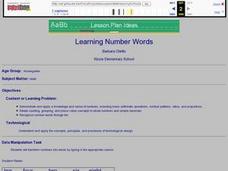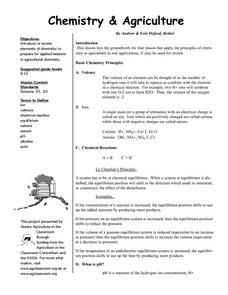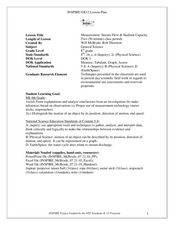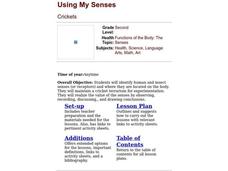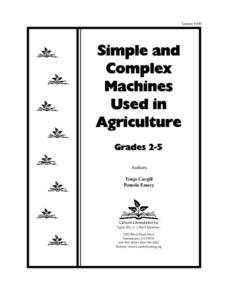Illustrative Mathematics
Operations with Rational and Irrational Numbers
Learners complete addition and multiplication tables that include rational and irrational numbers. They also answer a series of questions about the sums and products of irrational and rational numbers. One suggested modification would be...
Curated OER
Understanding Topographic Maps
Underclassmen create a cone-shaped landform and then draw a contour map for it. Then they examine a quadrangle (which was easily located with an online search), and relate it to what they experienced. The accompanying worksheet is...
Curated OER
Religious Influence On US History
Eleventh graders explore the influence of religion on U.S. History. Using an internet database website, they research the religious affiliation of governors, Presidents and Vice-Presidents. Students write a paragraph explaining how...
Curated OER
Learning Number Words
Students practice saying their numbers and identifying the words. They use whole numbers and decimals to practice grouping numbers into different categories. They write the word of the number they are shown.
Curated OER
Rolling with Links
First graders explore geometry by completing a worksheet in class. In this non-standard measurement unit lesson, 1st graders discuss different techniques for measuring items without the use of a ruler. Students read several short stories...
Curated OER
Basic Chemistry Principles
High schoolers use the basic principles of Chemistry to determine pH levels. Elements of the Periodic Table are also included in this lesson.
Curated OER
Words in the News Solar Sail
Bring current events into your classroom! Middle schoolers complete word work activities before reading and discussing an online article. They complete worksheets and an online quiz. They discuss the Solar Sail as radical new idea and...
Curated OER
Seeing Is Believing
Students investigate the concepts of probability. They use data to find the central tendency, median, and mode. Students design and play a game in order to practice the concepts. They also complete a table with data that is analyzed.
Curated OER
String 'Em Up
Students create different patterns using beads. They observe the teacher make patterns with different colored beads, identify the patterns, and create a necklace with colored beads, explaining what their pattern consists of to the class.
Curated OER
How's The Weather?
Students make a box and whiskers plot using the TI-73 graphing calculator. Each student would have their own calculator but they would work in small groups of two or three to help each other enter the data and make the plots.
Alabama Learning Exchange
Mix it Up! Exploring the Commutative and Associative Properties of Addition
Examine commutative and associative properties with your class. They'll explore the relationships between addition and subtraction and investigate patterns as they solve addition problems. Links to an assessment and a table game are...
Curated OER
What is a Hurricane?
Students research hurricanes on the Internet. In this hurricane lesson, students use the Internet to find out the basic shape of hurricane winds and classify three characteristics of hurricanes. Students then classify at least three...
Curated OER
Energy Conservation Lesson 1: Fossil Fuels and the Ticking Clock
Students explore energy production by participating in a class discussion. In this renewable energy lesson, students discuss the differences between solar, coal, wind and fossil fuel energy sources and why some are better for the...
Curated OER
Rate of Coral Growth
Using a table of information provided, middle school marine biologists chart data on a graph to determine the impact of water depth on coral growth in Australia's Great Barrier Reef. Then they answer questions that connect the data to...
Curated OER
Market Basics: Demand, Supply, and Price Determination
Students are introduced to the concepts of supply and demand. Using the Law of Demand and Supply, they develop charts and graphic models of supply and demand. They compare and contrast the behavior of consumers and suppliers when there...
Curated OER
Ocean Life: A Heavy Subject
Second graders examine The Learning Page Fact Files about ocean life and categorize the data by weight and group. They distinguish between fish, mammals, and invertebrates and which weigh the most and the least. Students record their...
Curated OER
Nutrition: How Much Fat Am I Eating?
How much fat is in this? Scholars first read some background information on the caloric content of fats versus carbohydrates, and then use that knowledge to analyze foods they regularly eat. They will look at 5 package labels for the...
Curated OER
Student Exploration: Fraction, Decimal, Percent
Students explore the concept of fractions, decimals, and percents. In this number sense lesson, students use a worksheet to guide them through the exploration of the relationship between fractions, decimals, and percents. Students work...
Curated OER
Macbeth: Denouement/Falling Action
Readers of Shakespeare explore denouement in Macbeth and track the play's falling action in Act IV, Scene 1. They complete a worksheet/table noting the content and significance of each of the three apparitions granted Macbeth by the...
Curated OER
Measurement: Stream Flow & Stadium Capacity
Eighth graders study the scientific fields and how information can be monitored and recorded. For this scientific inquiry lesson students view a PowerPoint presentation and complete a hands on activity.
Curated OER
Using My Senses
Second graders identify human and insect senses and where they are located on the body. They maintain a cricket terrarium for experimentation. They realize the value of the senses by observing, recording, discussing and drawing conclusions.
Curated OER
Simple and Complex Machines Used In Agriculture
Students explore agriculture and the current technologies and research that continue to make Earth a viable planet. This four lessons unit introduce students to simple machines and the concepts of force and friction through a variety of...
Curated OER
Using Information Resources: Lesson 4
Fourth graders review a variety of information resources and identify parts of a book. They practice brainstorming and practice skimming. They review all the research resources that are found in the library.
Curated OER
Using Blood Tests to Identify Babies and Criminals
Students solve a crime by matching a suspect's blood type to physical evidence collected at the crime scene. For this forensic science lesson, students identify the different blood types. They explain how blood tests work.





